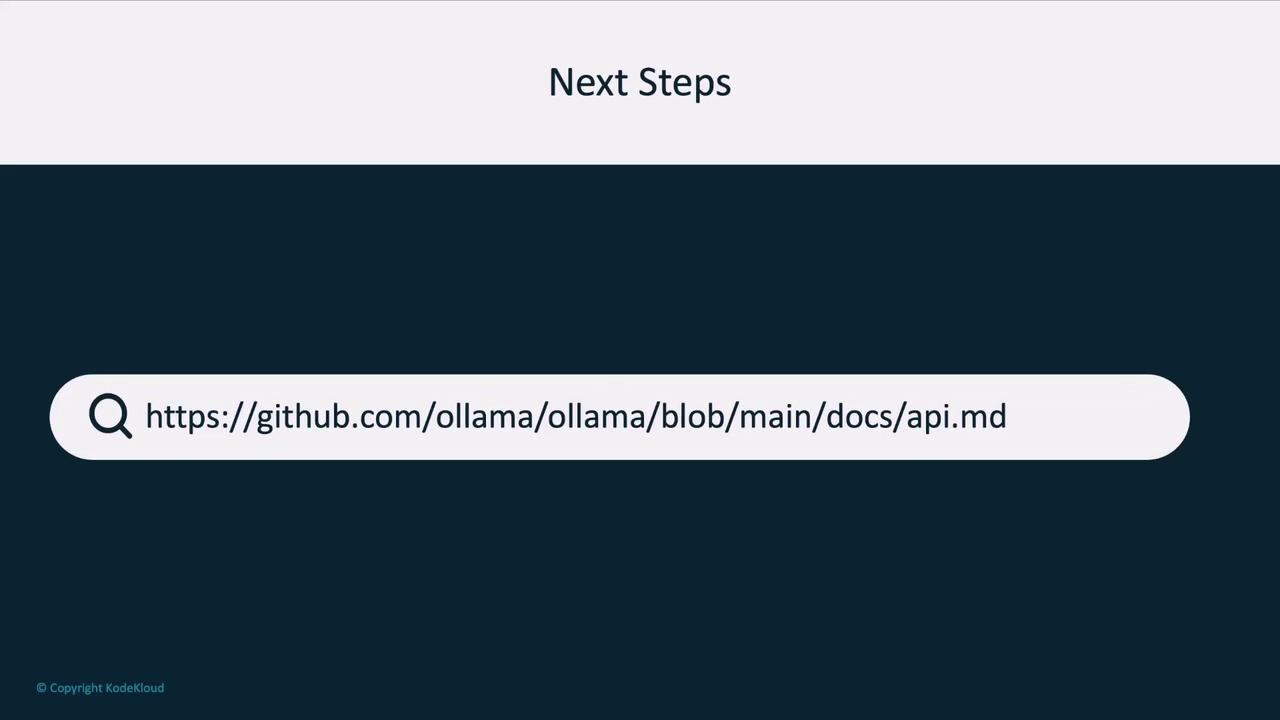Running Local LLMs With Ollama
Building AI Applications
Ollama REST API Endpoints
Leverage the Ollama REST API to integrate large language models (LLMs) into your applications over HTTP. Skip the CLI or chatbot UI—simply send requests to interact with models for text generation, conversational chat, and model management.
Generate Endpoint
The POST /api/generate endpoint returns a model’s completion for your prompt.
curl http://localhost:11434/api/generate -d '{
"model": "llama3.2",
"prompt": "Compose a poem on LLMs",
"stream": false
}'
By default, "stream": false delivers the full response at once. Set "stream": true to receive incrementally streamed data (word or phrase by phrase), emulating the gradual output of web chat interfaces.
Note
Streaming responses can improve perceived latency for long completions. Be sure your client can handle partial chunks.
Formatting the JSON Output
You can instruct Ollama to structure its response using a format schema:
curl http://localhost:11434/api/generate -d '{
"model": "llama3.2",
"prompt": "Compose a poem on LLMs",
"stream": false,
"format": {
"title": "string",
"theme": "string",
"lines": ["string"]
}
}'
Sample Response
{
"model": "llama3.2",
"created_at": "2025-01-09T06:31:38.309573Z",
"response": {
"title": "Cosmic Odyssey",
"theme": "Self-discovery in Language",
"lines": [
"In digital realms, I found my home",
"A tapestry woven from words and codes",
"Where meaning flows like starlight to the sea",
"I danced with syntax, a cosmic rhyme"
]
},
"done": true,
"done_reason": "stop",
"context": [123, 232, 123],
"total_duration": 18387332083,
"load_duration": 20368125,
"prompt_eval_count": 44,
"prompt_eval_duration": 501000000,
"eval_count": 68,
"eval_duration": 13140000000
}
titleandthemeare strings.linesis an array of strings—ideal for rendering multiline content.
Chat Endpoint
Use POST /api/chat to maintain conversational context. Provide an array of messages with roles (user or assistant).
curl http://localhost:11434/api/chat -d '{
"model": "llama3.2",
"messages": [
{
"role": "user",
"content": "Compose a short poem about LLMs."
},
{
"role": "assistant",
"content": "In circuits vast, they find their spark,\nLanguage learned in the digital dark.\nTransforming text with neural art,\nLLMs ignite a brand-new start."
},
{
"role": "user",
"content": "Add alliteration to the poem for more impact."
}
],
"stream": false
}'
Example Response
{
"model": "llama3.2",
"created_at": "2025-01-09T06:47:26.589285Z",
"message": {
"role": "assistant",
"content": "Here's an updated version of the poem:\n\nIn silicon sanctums,\nsparks take flight,\nLanguage learning lattices shine so bright.\nNeural networks navigate nuanced space,\nTransforming text with sophisticated pace.\n\nLet me know if you'd like any further adjustments!"
},
"done": true,
"done_reason": "stop",
"total_duration": 3393490083,
"load_duration": 807877958,
"prompt_eval_count": 88,
"prompt_eval_duration": 1319000000,
"eval_count": 53,
"eval_duration": 954000000
}
Here, repeated initial sounds like s in “silicon sanctums, sparks” and l in “Language learning lattices” provide alliteration.
Model Management Endpoints
Ollama’s REST API also lets you list, inspect, copy, delete, and pull models without switching to the CLI.

Endpoint Summary
| Endpoint | Method | Description |
|---|---|---|
/api/list | GET | List all available local models |
/api/copy | POST | Duplicate a model under a new name |
/api/delete | DELETE | Remove a specified local model |
/api/pull | POST | Download a model from the Ollama repo |
Usage Examples
# Copy a model locally
curl http://localhost:11434/api/copy -d '{
"source": "llama3.2",
"destination": "llama3-copy"
}'
# Delete a model (use with caution)
curl -X DELETE http://localhost:11434/api/delete -d '{
"model": "llama3:13b"
}'
# Pull a model from the Ollama library
curl http://localhost:11434/api/pull -d '{
"model": "llama3.2"
}'
Warning
Deleting a model is irreversible. Ensure you specify the correct model name to avoid accidental data loss.
Full API Reference
For a complete list of endpoints and detailed parameters, see the official API documentation.

Next, we'll demonstrate how to call these endpoints programmatically using an OpenAI-compatible client library. Stay tuned!
Links and References
Watch Video
Watch video content